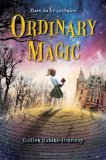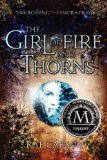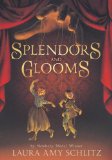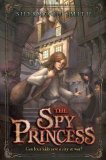Review of Ordinary Magic, by Caitlen Rubino-Bradway
by Caitlen Rubino-Bradway
Bloomsbury, New York, 2012. 276 pages.
Starred Review
Abby Hale lives in a world where it’s normal to have magic. She’s the youngest of five children, and her two older sisters and two older brothers all came out as having very high levels of magic at their Judging.
But Abby? She’s twelve years old and ready for her Judging. And it turns out she has no magic at all. She’s completely ordinary, called an Ord by “normal” people.
Ords are considered barely human. However, they do have one skill in this magical world — magic doesn’t affect them, so they can walk right through charms and protective spells. Because of this, Adventurers like to have an Ord along to make treasure accessible. And they’re willing to do whatever it takes to get one.
Fortunately, Abby’s family would never sell her, ordinary or not. In fact, her sister works at a school established for Ords in the capital city, a school that’s supposed to keep them safe.
But staying safe isn’t easy in a world accustomed to thinking of Ords as having no rights.
This book was a lot of fun, especially all the ways it was exactly the opposite of Harry Potter. Instead of learning she’s a Wizard in a world of Muggles, Abby finds out she’s an Ord in a world of Magic Users — normal people.
I love the way the author conveys what’s normal in that world. For example, Abby’s complaining about the “realistic” fiction she has to read in class:
All the authors we read are boring. All the stories we read are about people hating each other and being miserable. And there aren’t even any carpet chases or magic fights or somebody turning somebody else into a toad. There are no dragons. How realistic can you be without dragons?
In another place, parts of their house have been unmagicked, so that Abby can get around in it.
I knew it was a pain for my family at first — to have to use little knobs to turn on the water in the bathroom instead of just poofing the perfect pressure and temperature, and having doors open to just one room instead of whatever room it was you wanted — but nobody said anything.
At school, they’re trained in self-defense, because there are so many people out there who would like to capture them and use them, or, in the case of red caps, eat them. I laughed at this section, where the teacher is explaining why they have to learn more languages than normal people do in their schools:
Here language was required every single year. We were going to learn a different language each year, and in order to graduate to the next grade we’d have to be what Mr. O’Hara called “functionally fluent.”
“Why? So we’re ready to be bought and sold?” Peter muttered under his breath.
“In case you’re bought and sold,” Mr. O’Hara answered so everyone could hear. “I think you’ll find escape much easier if you know the local language.” And then he spent the rest of the class introducing us to Astrin and teaching us the tourist basics, like hello, good-bye, please, thank you, and help, I’m being kidnapped!
In general, this book is a whole lot of fun. It beautifully shows you Abby’s affection for her loving, quirky family. It’s a little weaker in showing her friendships at school. That’s the point where it begins to pale in comparison to Harry Potter. There are also two places where the author destroys the suspense by telling you right up front that Abby gets out of it:
What happened next was my fault. I just want to say that straight out. I know Olivia blamed Peter, and Alexa blamed, you know, the actual people responsible, but I should have known better.
Once she’s said that, at the beginning of the chapter, you just can’t think that she’s going to be away from Olivia and Alexa (her sisters) for very long at all. If they’re arguing about who’s at fault, we know she gets out of the situation before too long.
In another place, we read, “King Steve told me later that they modeled the alarm system on the cries of real-life banshee.” That takes the teeth out of a sentence on the very next page which includes the phrase, “if I got out of this and saw King Steve again…”.
I also wasn’t completely satisfied with where it ended. In the Harry Potter books, I always scoffed that these adventures took precisely one school year. In this book, though there is a climax, the adventure doesn’t feel complete. We have some very important loose threads left hanging. The book ends at the end of the school year, but it feels like a random place to end.
However, these were minor details in a delightful debut novel. This book is full of good-natured teasing between a family who loves each other. It pokes fun at conventions of fantasy stories by turning them on their heads. And along the way, it creates a credible imaginary world and fleshes it out with details. As well as looking closely at how it feels to be on the wrong side of prejudice. I definitely want to read the next book just as soon as it comes out. I want to find out what happens to the loose ends left hanging, and, especially, I want to spend more time with Abby Hale and her family.
Find this review on Sonderbooks at: www.sonderbooks.com/Childrens_Fiction/ordinary_magic.html
Disclosure: I am an Amazon Affiliate, and will earn a small percentage if you order a book on Amazon after clicking through from my site.
Source: This review is based on a library book from the Fairfax County Public Library.
Disclaimer: I am a professional librarian, but I write the posts for my website and blogs entirely on my own time. The views expressed are solely my own, and in no way represent the official views of my employer or of any committee or group of which I am part.
Please use the comments if you’ve read the book and want to discuss spoilers!









